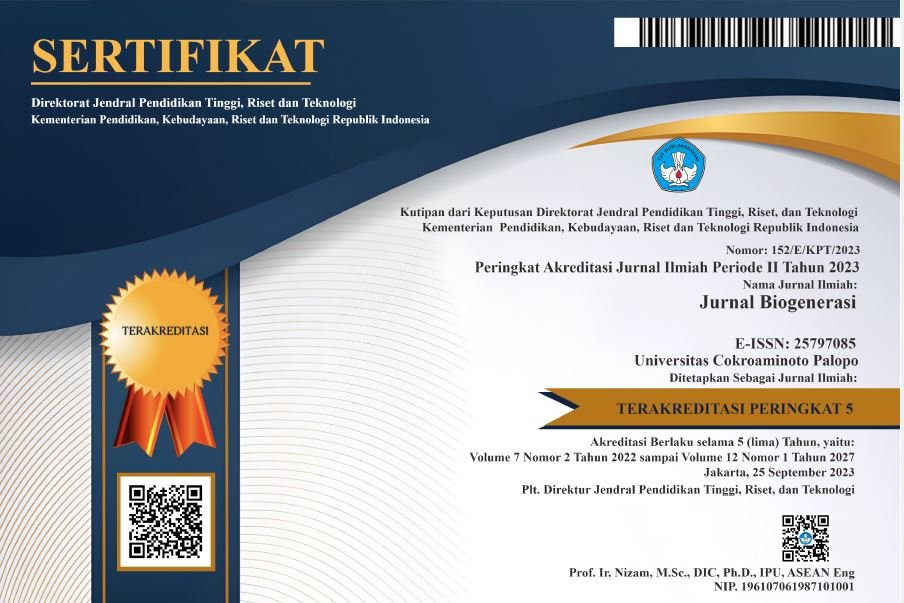PENGARUH PENERAPAN PROBLEM BASED LEARNING DENGAN TEKNIK MIND MAPPING TERHADAP HASIL BELAJAR BIOLOGI PESERTA DIDIK
DOI:
https://doi.org/10.30605/biogenerasi.v6i1.1222Keywords:
problem based learning, mind mapping, learning outcomesAbstract
This study aimed to determined the influence of problem based learning model with mind mapping techniques toward the biology learning outcomes. This study was a pre- experimental reasearch with one group pretest - posttest design. The sample of study consisted of one class is a class XI IPA9 SMAN 1 Sungguminasa as 50 students. Sample was take with a random sampling technique. The research instrument is learning outcome test in biological material (excretory system) with multiple choice shaped. Data were analyzed by employing inferential test (paired samples). The result of inferential analysis indicated that tcount 46.682>ttable 1.68, H0 was rejected, meaning that there was influence of problem based learning model by employing mind mapping technique toward students’ learning result.
Downloads
References
Buzan, Tony. 2009. Buku Pintar: Mind Map. Gramedia Pustaka Utama: Jakarta.
Departemen Pendidikan Nasional. 2006. Kurikulum Tingkat Satuan Pendidikan. Depdiknas.
Ennis, R.H. 1985. Goal Critical Thinking Curriculum. Dalam Costa, A.L. (Ed):Developing Minds: a resource book for teaching thinking. Alexandria, Virginia: Association for Supervision and Curriculum Developing (ASCD).
Ismail. 2011. Penerapan Model Pembelajaran Inquari dan PBL yang Terintegrasi dengan STD Dalam Mengukur Hasil Belajar Kognitif, Afektif, dan Psikomotoirk Siswa. Tesis UM Malang. Malang
John Dewey. 1916. Developing Science Students' Metacognitive Problem Solving Skills. (Online). Australian Journal of Educational Technology, 17(1).
Karmana. 2010. Pengaruh penerapan model PBL yang terintegrasi STAD terhadap hasil belajar kognitif, kemampuan berfikir kritis, dan kemampuan metacognitif pada siswa SMK Saraswati Bali. Tesis UM Malang. Malang.
MacGregor, Sandy. 2006. Piece of Mind: Mengaktifkan Kekuatan Pikiran Bawah Sadar Untuk Mencapai Tujuan. Gramedia Pustaka Utama: Jakarta.
Palluvi. 2010. Analisis Kemampuan Berfikir dan Belajar Peserta Didik. PT. Rosdakarya. Bandung
Reta, I Ketut. 2012. Pengaruh Model Pembelajaran Berbasis Masalah terhadap Keterampilan Berpikir Kritis Ditinjau dari Sudut gaya Kognitif. Artikel. Tidak diterbitkan. Program Pasca Sarjana Universitas Pendidikan Ganesha.
Ristiasari, T., Priyono, B,. Sukaesih, S. jurnal: Model Pembelajaran Problem Solving Dengan Mind Mapping Terhadap Kemampuan Berpikir Kritis Siswa. Unnes.J.Biol.Educ . 1 (3) (2012).
Sagala, Syaiful. 2009. Konsep dan Makna Pembelajarn. Alfabeta: Bandung.
Savin-Baden, M., Major, C.H. 2001. Foundation of Problem Based Learning. London: SRHE/Open University Press.Savinainen, A. and Scott, P. 2002. The Force Concept Inventory: A Tool for Monitoring Student Learning. Physics Education, 37 (1), 45–52.
Silaban, R. 2012. Pengaruh Media Mind Mapping Terhadap Kreativitas Dan Hasil Belajar Kimia Siswa Sma Pada Pembelajaran Menggunakan Advance Organizer. Artikel. FMIPA Universitas Negeri Medan
Wulandari. 2011. Pengembangan Perangkat Pembelajaran Berbasis PBL dan Inquary. Tesis UPI Bandung. Bandung.
Downloads
Published
How to Cite
Issue
Section
License
In submitting the manuscript to the journal, the authors certify that:
- They are authorized by their co-authors to enter into these arrangements.
- The work described has not been formally published before, except in the form of an abstract or as part of a published lecture, review, thesis, or overlay journal.
- That it is not under consideration for publication elsewhere,
- That its publication has been approved by all the author(s) and by the responsible authorities – tacitly or explicitly – of the institutes where the work has been carried out.
- They secure the right to reproduce any material that has already been published or copyrighted elsewhere.
- They agree to the following license and copyright agreement.
License and Copyright Agreement
Authors who publish with this journal agree to the following terms:
- Authors retain copyright and grant the journal right of first publication with the work simultaneously licensed under Creative Commons Attribution License (CC BY 4.0) that allows others to share the work with an acknowledgment of the work's authorship and initial publication in this journal.
- Authors are able to enter into separate, additional contractual arrangements for the non-exclusive distribution of the journal's published version of the work (e.g., post it to an institutional repository or publish it in a book), with an acknowledgment of its initial publication in this journal.
- Authors are permitted and encouraged to post their work online (e.g., in institutional repositories or on their website) prior to and during the submission process, as it can lead to productive exchanges, as well as earlier and greater citation of published work.



.png)

